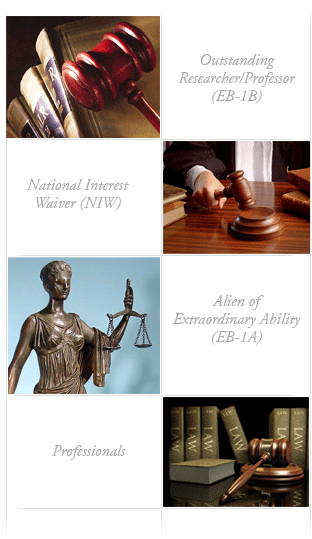|
H-1B Cap-Gap Issue
 H-1B quota can be applied for as of April 1st each year and the earliest H-1B start date is October 1st. However, some H-1B applicants’ OPT will expire before October 1st. People in this situation usually ask, “Can I stay here and continue working after my OPT expires?” This is called “Cap-Gap” issue. US Department of Homeland Security has given guidance on this issue*. H-1B quota can be applied for as of April 1st each year and the earliest H-1B start date is October 1st. However, some H-1B applicants’ OPT will expire before October 1st. People in this situation usually ask, “Can I stay here and continue working after my OPT expires?” This is called “Cap-Gap” issue. US Department of Homeland Security has given guidance on this issue*. What is “Cap-Gap”?
Current regulations allow certain students with pending or approved H-1B petitions to remain in F-1 status during the period of time when an F-1 student’s status and work authorization would otherwise expire through the start date of their approved H-1B employment period. This is referred to as filling the “cap-gap,” meaning the regulations provide a way of filling the “gap” between the end of F-1 status and the beginning of H-1B status that might otherwise occur if F-1 status is not extended for qualifying students.
My OPT expired during my H-1B case’s pending period. Am I covered by the cap-gap extension?
If your H-1B was filed while your OPT status had not yet expired and your H-1B requires a start date of 10/1/2011, you will be covered by this cap-gap extension. This automatic cap-gap extension will begin and will continue until the H-1B petition adjudication process has been completed. You can continue working during this period.
Can I get a proof of continuing status under this automatic cap-gap?
Yes, you should go to the Designated School Official (DSO) of your school (usually an international office) with evidence of your H-1B case filing receipt (Form I-797, Notice of Action) from USCIS. The DSO will issue a cap-gap I-20 indicating the continued extension of F-1 status.
If my case has still not been approved after October 1, 2011, can I continue working?
No. If the H-1B petition is pending beyond October 1, a student can remain in the United States based on the pending change of status petition. However, a student with OPT employment authorization extended through the cap gap period must stop working until the H-1B petition is approved.
Can I continue working if my H-1B was filed after my OPT expired but during my OPT 60-day grace period?
No, you cannot work because your 60-day grace period is not employment-authorized. The automatic cap-gap extension only extends your status at the time of the H-1B case filing. So in this situation, only your grace period is extended. Although you cannot work, you can stay here in the US to wait for the completion of your H-1B petition adjudication.
If my H-1B is denied, am I still allowed the 60-day grace period?
Yes. If USCIS denies your H-1B case, you will have the standard 60-day grace period from the date of the notification on the denial before you are required to depart the United States.
Can I travel outside the United States during a cap-gap extension period and return in F-1 status?
No. You cannot travel outside the United States with your F-1 visa during the cap-gap extension. If you leave the US before your H-1B is approved, you will need to apply for an H-1B visa at a consular post abroad prior to returning after your H-1B is approved and come back to the US not more than 10 days before the H-1B state date.
If I have an approved H-1B petition and change of status, but I am laid off/terminated by the H-1B employer before the H-1B effective date, and I have an unexpired EAD issued for post-completion OPT, can I retrieve any unused OPT?
Yes. You will remain in student status and can continue working under OPT using the unexpired EAD until the H-1B change of status goes into effect. But an H-1B withdrawal notice needs to be sent to the USCIS before your H-1B effective date starts.
Yang & Associates, LLP specializes in immigration law and provides comprehensive immigration legal services to individuals, businesses, and universities. It is dedicated to providing the highest quality services with a most competitive fee schedule. Its attorneys have decades of combined immigration law practice experience and have handled more than one thousand EB-1A, EB-1B, NIW, PERM, H-1B, L-1, O-1, EB-5, I-485, I-130 and other types of immigration cases. If you have any questions or need a free case evaluation, please contact our attorneys at: .
|